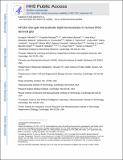APOE4 disrupts intracellular lipid homeostasis in human iPSC-derived glia
Author(s)
Sienski, G; Narayan, P; Bonner, JM; Kory, N; Boland, S; Arczewska, AA; Ralvenius, WT; Akay, L; Lockshin, E; He, L; Milo, B; Graziosi, A; Baru, V; Lewis, CA; Kellis, M; Sabatini, DM; Tsai, LH; Lindquist, S; ... Show more Show less
DownloadAccepted version (944.0Kb)
Open Access Policy
Open Access Policy
Creative Commons Attribution-Noncommercial-Share Alike
Terms of use
Metadata
Show full item recordAbstract
Copyright © 2021 The Authors, some rights reserved; exclusive licensee American Association for the Advancement of Science. No claim to original U.S. Government Works The E4 allele of the apolipoprotein E gene (APOE) has been established as a genetic risk factor for many diseases including cardiovascular diseases and Alzheimer’s disease (AD), yet its mechanism of action remains poorly understood. APOE is a lipid transport protein, and the dysregulation of lipids has recently emerged as a key feature of several neurodegenerative diseases including AD. However, it is unclear how APOE4 perturbs the intracellular lipid state. Here, we report that APOE4, but not APOE3, disrupted the cellular lipidomes of human induced pluripotent stem cell (iPSC)–derived astrocytes generated from fibroblasts of APOE4 or APOE3 carriers, and of yeast expressing human APOE isoforms. We combined lipidomics and unbiased genome-wide screens in yeast with functional and genetic characterization to demonstrate that human APOE4 induced altered lipid homeostasis. These changes resulted in increased unsaturation of fatty acids and accumulation of intracellular lipid droplets both in yeast and in APOE4-expressing human iPSC-derived astrocytes. We then identified genetic and chemical modulators of this lipid disruption. We showed that supplementation of the culture medium with choline (a soluble phospholipid precursor) restored the cellular lipidome to its basal state in APOE4-expressing human iPSC-derived astrocytes and in yeast expressing human APOE4. Our study illuminates key molecular disruptions in lipid metabolism that may contribute to the disease risk linked to the APOE4 genotype. Our study suggests that manipulating lipid metabolism could be a therapeutic approach to help alleviate the consequences of carrying the APOE4 allele.
Date issued
2021-03-03Department
Whitehead Institute for Biomedical Research; Picower Institute for Learning and Memory; Massachusetts Institute of Technology. Department of Biology; Howard Hughes Medical Institute; Massachusetts Institute of Technology. Computer Science and Artificial Intelligence Laboratory; Koch Institute for Integrative Cancer Research at MITJournal
Science Translational Medicine
Publisher
American Association for the Advancement of Science (AAAS)